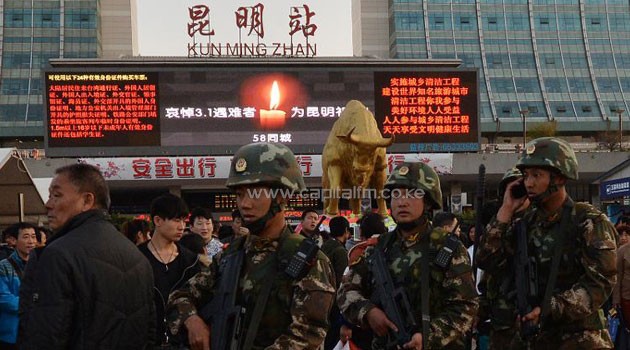
Paramilitary police patrol outside the Kunming train station, the site of a machete attack, in Yunnan province on March 3, 2014/AFP
Until now, disturbances have largely been confined to Xinjiang, a vast resource-rich area in far western China, and focused on symbols of the Chinese state, such as police.
But the scale, location, nature and timing of the Kunming mayhem potentially points to a change in mindset with the overt targeting of civilians – whoever was behind it.
Beijing immediately labelled the incident as terrorism, and Washington followed suit on Monday after initially referring to it as a “tragedy”, in language that drew angry accusations of double standards on Chinese social media.
“You can’t class this attack as other than a terrorist attack,” Michael Clarke, an expert on Xinjiang at the Griffith Asia Institute in Brisbane, Australia, told AFP, adding that it was designed to “induce fear amongst the Chinese populace”.
Xinjiang is home to Uighurs and other ethnic minorities with strong cultural and historical links to neighbouring Central Asian states such as Uzbekistan and Kazakhstan. It has seen regular clashes for much of the past year.
Uighurs resent decades of immigration by China’s Han majority they say has brought economic inequality and discrimination in education and religious affairs, such as a campaign to stop the Muslim practice of women covering their faces.
China counters that it plays a positive role and has brought about development and improvements to health and living standards.
Deadly incidents as reported in state media and by exile groups often centre on violence between Uighurs and local police and security authorities, with both sides trading accusations over who is to blame.
But Saturday’s bloodshed in the southwestern city of Kunming, where knife – and machete-wielding attackers clad in black killed 29 people and wounded 143, stands out for its brutality and targeting, analysts say.
“It must have taken a lot of planning and involved the recruitment of a large number of attackers who assumed most would die,” said Gardner Bovingdon, an expert on the history and politics of Xinjiang at Indiana University in the United States.








































